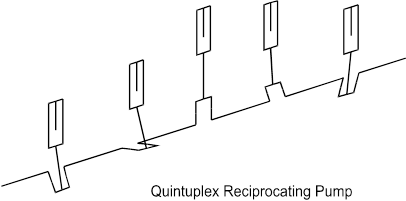Reciprocating Pump Torsional Analysis For OEM
Reciprocating Pump Torsional Analysis for OEM
MSI was contracted by a major domestic pump manufacturer to determine the torsional natural frequencies of a machinery train consisting of a five plunger reciprocating pump, a gear set including an intermediate shaft, and a VFD/motor driver. The natural frequencies were calculated and compared to likely excitation frequencies. A complete forced response analysis was performed, with modal damping and excitation force strengths based upon theoretically maximum loads and worst case torque spectra from shop and field testing of similar machines. To accomplish this analysis, a full 3D finite element model was constructed which explicitly modeled both the reciprocating and rotating parts, including all connecting rods, crossheads, and plungers.
The torsional critical speed analysis showed that some intersection of excitation frequencies and natural frequencies caused several resonances to occur in the operating range. However, the worst-case forced response analysis proved that the maximum amount of stress which would occur at these resonances was acceptable relative to shaft fatigue criteria. Using the information from these analyses, the manufacturer was able to proceed confidently with parts ordering and fabrication of the pump/gear/motor assembly, with the design unmodified.
REAL-WORLD EXAMPLES AND CASE STUDIES
MSI In Action
Case Study
Troubleshooting a Pipeline Renewable Diesel Screw Pump
Elevated vibration levels were causing a pipeline company screw pump problems.
Case Study
Petrochemical Ammonia Recip Compressor Piping Troubleshooting
Excessive motion by the discharge piping of a petrochemical ammonia reciprocating compressor startled the operators.
Case Study
Oil Tanker Pumping Station Screw Pump Troubleshooting
Troubleshooting a new oil tanker pumping station in Colombia consisting of 4 screw pumps. Specialized testing revealed that piping natural frequencies were to blame.

